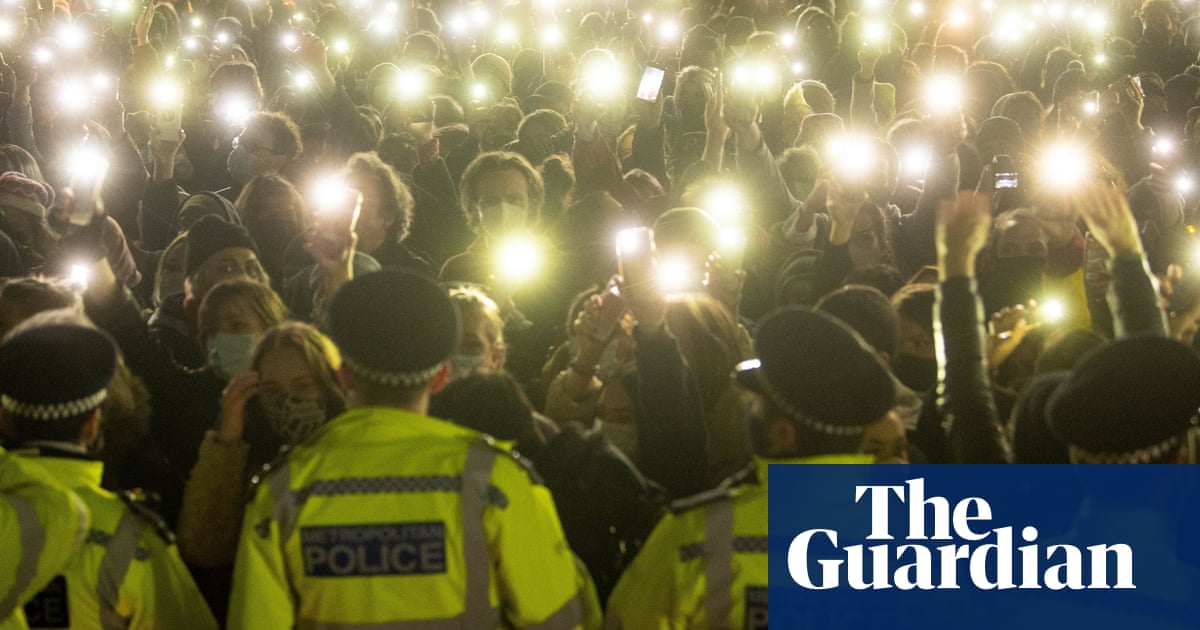
The news that 28-year-old teacher Sabina Nessa appears to have been murdered last weekend in south-east London was received with shock and anger, reigniting the conversation around what it will take to end gendered violence.
After Sabina’s body was discovered, Greenwich council swiftly distributed 200 rape alarms to local women. This, along with the proposal of better street lighting, has been roundly criticised for simply “shining a brighter light on the inadequacy of the state’s response”.
A similar debate emerged after Sarah Everard disappeared from Clapham in south London in March, with Lambeth police advising women simply to curfew themselves while the perpetrator – now known to be ex-police officer Wayne Couzens – remained at large. Reclaim These Streets formed to hold a nighttime vigil in protest at police attempts to displace the responsibility for gendered violence on to women. They were then browbeaten into abandoning the vigil by the Met, which refused to allow it under Covid-19 regulations. When Sisters Uncut stepped in to lead the 1,000-strong vigil, the police response was a crackdown, violently arresting a number of the women attending.
The revelation that a serving police officer had been arrested for Everard’s murder, alongside shocking images of police brutality towards those attending the vigil in her name, reinforced scepticism as to whether police protect women. As we grieve the death of Sabina, it is crucial that we resist calls for more police officers and more laws.
In the weeks after Couzens’ arrest, media interest shone a light on the “endemic” rates of domestic violence perpetrated by police officers. According to research conducted by the Centre for Women’s Justice (CWJ), one woman a week has come forward to report a serving police officer for domestic or sexual violence. Despite the police maintaining that their role in tackling gendered violence is paramount, this does not appear to include investigating and prosecuting their own, with a 3.9% conviction rate compared with the general population rate of 6.2%. CWJ maintains this is due to a “locker room” culture that turns a blind eye to gendered violence, especially when perpetrated by their own officers. There is an ongoing investigation into whether Kent police properly investigated an allegation against Couzens of indecent exposure six years before he murdered Everard.
Sadiq Khan’s response to the Sabina Nessa case has been to revive proposals to make misogyny a hate crime, but we already have laws against harassment and assault, and they have done nothing to stem gendered violence. What’s more, the additional police powers and longer sentences that promised to tackle gendered violence have backfired spectacularly – women are being criminalised by the same measures that were introduced to protect them.
In recent decades responses to domestic violence have favoured carceral (prison) over community solutions resulting in a rise in women being locked up. My own research has found that the increased presence of police in women’s lives has made it more likely they will be arrested, through perpetrators manipulating the system or police targeting women for unrelated matters such as immigration enforcement. A 2018 freedom of information request found that more than half of all police forces in England and Wales have a record of arresting domestic and sexual violence survivors who have insecure immigration status.
The trend of dealing with social problems with more police powers and longer sentences has not been limited to domestic violence, and has seen a general “net-widening” effect with the number of women in prison skyrocketing. Women are being punished and criminalised through what has been called the “abuse-to-prison pipeline”. Prison Reform Trust research showed that more than half (53%) of female prisoners had experienced emotional, physical or sexual abuse as a child, compared with 27% of men. The charity Women in Prison has found that 79% of the women who use its services have experienced domestic violence and/or sexual abuse.
Criminal justice solutions that were purported to address gendered violence have only made matters worse for many women. Women should be allowed the right to protest against this system – a right that the “kill the bill” movement is fighting to preserve in the face of the extraordinary police powers proposed in the police, crime, sentencing and courts bill – and should fight for a transition to education and community-based solutions. Only then can we end the cycle of violence.
Aviah Day is a lecturer in criminology at Birkbeck, University of London, and an activist fighting gendered and state violence












